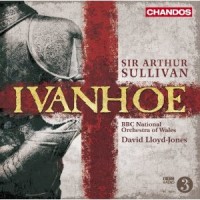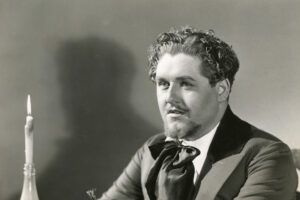
I own almost every recording of the 13 operettas Sir Arthur Sullivan wrote with W.S. Gilbert ever made. Twelve Mikados, 14 Pirates of Penzance, 10 Iolanthes, right on down the line to the rarely heard Utopia, Ltd. I was a G&S fan long before I got into opera; when I was a teenager, their operettas were my “gateway drug” into the “hard stuff” such as Mozart, Wagner and the occasion hit of Mussorgsky.
So it was with a glee bordering on hysteria that I sat down to listen to a brand new recording of Sullivan’s most significant effort without Gilbert, and his only “grand opera”, Ivanhoe.
Throughout his career, Sullivan remained unsatisfied and ill at ease in the world of comic light opera. Sure, he did them extremely well, and sure, they made both him loads of money and a household name. He even got a knighthood out the deal (a full decade before Gilbert was given his). All well and good, but the mantle of “comic composer” sat uneasily on his shoulder, just as it did on Offenbach’s. He wanted bigger and better things in an artistic sense, and had grand plans to bring England to the forefront of the operatic world.
Thus, Ivanhoe: an English-language opera in the best Italian style, based on perhaps the greatest of British novels by the great Sir Walter Scott (the fact that Scott was, well, Scottish didn’t seem to deter them.) The opera was an initial success both commercially and critically (George Bernard Shaw hated it, but then again he hated everything), but interest waned and productions costs mounted.
Despite racking up an initial run of a record-making 155 performances, the opera closed at a significant loss. Sullivan went back to writing operettas and Ivanhoe soon vanished into the annals of history. I hate to say it, but a quick listen to the opera will prove why it suffered that ignoble fate.
One of the things I like most about Sullivan’s operettas is that they generally provide more than a quick laugh. He was a master parodist, and the send-ups of Handel, Mozart and Verdi that feature in several of the works are not only hilarious, but also thrilling music in their own right. His operettas feature not only yucks and giggles but also genuinely heartfelt ballads, stirring chorales and masterly built act one finales that, in the best operatic tradition, build slowly to an exhilarating climax.
This is especially apart in The Yeomen of the Guard, a basically serious subject where the comic characters provide relief from the drama rather than visa-versa. In Yeomen especially, one finds the merit of a first-rate composer in Sullivan that too often gets dismissed by the snobbish opera-going public.
That’s why Ivanhoe is so disheartening. Apart from an intriguing motif here or a beautiful melody there, much of what occurs in this opera can only be described as second-rate. There’s heaps of dreary recitative and uninteresting choral music. It’s generally large, self-important, and of a very British story-book character. The problem, as it so often does, lies primarily with the libretto of Julian Sturgis. Characters rarely speak, they proclaim. The action is slow moving and great chunks of plot are kind of skimmed over.
Apparently, knowing the source novel helps a great deal. I do not, and so was left mystified as to, for example, why the mysterious contralto who showed up at the start of act two hurls herself off a parapet like a medieval Tosca in the middle of act three. There’s no great dramatic thrust of the work, and the overall effect is akin to sitting though a middling TV movie version of Robin Hood (who, true to the novel, makes a brief appearance).
Thankfully for all involved, including the home listener, this is a very fine performance of the opera. David Lloyd-Jones, on podium duty, holds the score together admirably, and both the BBC National Orchestra of Wales and the Adrian Partington Singers are very fine ensembles. Toby Spence brings a lovely heroic ring to the title character, and James Rutherford snarls menacingly as the villainous Brian de Bois-Guilbert. Peter Rose does the usual “noble bass” business, which is more than enough for Ivanhoe’s honor-bound father Cedric, and tenor Peter Wedd shows off an impressive lyric instrument as secondary baddy de Bracy.
Catherine Wyn-Rogers mutters ominously as Ulrica, who at least gets an eerie spinning song before she goes over the edge. Matthew Brook, as Friar Tuck, gets the opera’s best known tune (a drinking song entitled, Britishly enough, “Ho Jolly Jenkin”) and makes the most of his comic relief scenes with Neal Davies’ stentorian King Richard. Janice Watson is a tad impersonal as Ivanhoe’s love Rowena, but as the selfless Rebecca, the Jewish girl who loves Ivanhoe unrequitedly, Geraldine McGreevey gives the set’s standout performance. It helps that she generally gets the most beautiful music of the opera. Also, the detailed booklet essay and full libretto provided are a definite plus.
It is, in the end, nice to have a worthwhile recording of the opera. The only option available before this was a recording by the only-nominally-professional Prince Consort Opera, which features incredibly terrible performances from the orchestra, chorus and several of the singers. Having a professional performance of this opera is certainly a good thing. It deserves a listen. But I cannot see Ivanhoe being of use to anyone but Sullivan fans, Scott fanatics, opera completists. A shame.



























Comments